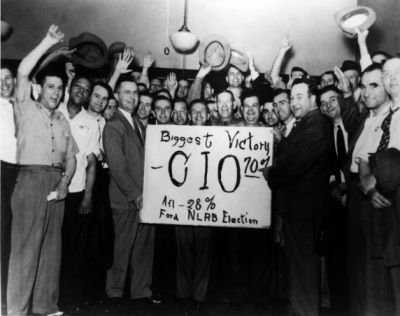
New Orleans The NLRB on the last day when it had enough members to issue rulings before its one Republican member’s resignation took effect issued what could be a momentous decision, if allowed to stand, by returning the definition of co-employer status to pre-1980 interpretations. The headlines are saying this decision creates a path for organizing fast food workers. I’ll have to think about that. It definitely clarifies bargaining relationships, but one centralized corporate entity has not meant there has been a smooth path for organizing Walmart or other major retailers, and their workforces are larger by a factor of ten, compared to most fast food stands. We’ll see whether there’s any union that wants to step up to the task now, but as I’ve argued previously, the NLRB organizing route will still be unattractive to any union not willing to make a twenty to thirty year investment in such a strategy. The real impact of this decision will be for the gazillion subcontracted workers, temporary workers, casual workers and their precarious grasp on their jobs and the fragile and fraught bargaining positions of their unions working with them to protect and advance their interests.
The decision was brought on a case involving Browning-Ferris or BFI as most of us know the outfit. Along with Waste Management they are one of the huge companies that have marketed and benefited from the push for municipal privatization of sanitation and recycling services in the USA. The little known reality of such privatization by the taxpayers in these cities is that most of the labor, usually all but the truck drivers, is subcontracted out to temporary employment services. The Teamsters in this case organized the subcontracted recycling center workers and, correctly, wanted to push BFI to the table since they controlled pretty much everything about the job.
Local 100 United Labor Unions knows this routine intimately. Almost twenty years ago when we organized hundreds of minimum wage laborers on the back of Waste Management garbage trucks throughout south Louisiana cities in New Orleans, Lafayette, and Baton Rouge it was front page news in The Wall Street Journal. We won all of the elections but only after losing a hearing at the NLRB where we tried to force Waste Management to be named a co-employer. Later in winning the contract the temporary company admitted to us that they had perjured themselves at the hearing because Waste Management had told them it would cancel their contract if they were named a joint employer. By that time we had won huge wage and benefit increases by exploiting the fact that as semi-casual workers our members could simply decide they were tired and not come to work and by demonstrating how that worked in July as garbage sat rotting and stinking in heat and humidity, we closed the contract at 11 PM one night to keep the trucks rolling and the hoppers, as the laborers were called, slinging the cans into the truck. We organized similar workers in Dallas who in fact were called gunslingers there.
Regardless the wink-and-nod dodge of these companies has meant that we have had to reorganize them time after time. We have a huge case still pending before the NLRB on one company. This same situation exists in tens of thousands of other situations where companies routinely evoke 30-day cancellations when a union is organized. Pushing the joint employer buttons years ago led to the first victories in Pittsburgh for the Justice for Janitors campaign when building owners buckled, and that same reality has triggered other successes where property owners were pressured successfully, though before this new decision at some risk of secondary boycott charges. Now they will likely either have to employ the workers directly or stand up and carry their burdens. Same for hotels that have subbed out their housekeepers, schools that flip over their custodial and food service contractors, nursing homes that do the same, and on and on and on. The huge percentage of wage theft and unfair labor practice claims that are never collected because the subcontracts have collapsed may now finally come due as well.
It will be interesting to see whether or not public employers can be forced to the table as well. That’s one worth watching.
So who knows when and how this might impact fast food workers other than to make McDonalds and the like liable for unfair labor practices, but, regardless, this is huge for the vast millions of part-time, contingent workers on subcontracts everywhere.
For workers – and their unions – this is a game changer.
***